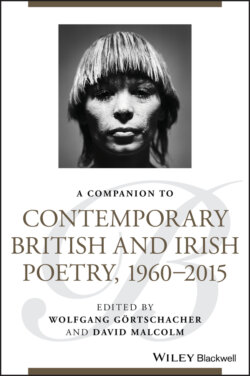Читать книгу A Companion to Contemporary British and Irish Poetry, 1960 - 2015 - Группа авторов - Страница 31
Jackie Kay, From The Adoption Papers (1991) (Chapter 3 “The Waiting Lists”—“I Thought I'd Hid Everything”) (Kay 2007, 20–21)
ОглавлениеThis poem tells an anecdote clearly and captures a historical moment with accuracy and benignity. It is written in a relaxed free verse, with line length (from 11 to 3 syllables) and numbers of main stresses per line (from one to five) aiming to give the sense of a voice recounting an incident. One's sense of a voice talking naturally to someone is reinforced by a lack of metrical patterning (although three iambic trimeters—lines 13, 26, and 44—do occur). The three‐line stanzas do not serve any purpose other than to break up the narrative into smaller and more accessible units. One wonders, indeed, if the poem would lose anything substantial if it were written out as prose.
The voice is that of a woman who is being assessed by a child adoption agency for a baby that she desperately wants, although it transpires that she values a political honesty too. The woman is Scottish, and the language has several markers of standard spoken (and sometimes written) Scots—“hid” (line 1), “widnae wan” (line 2), “she's no be” (line 5), “willnae” (line 18), “times” (line 35). The reader is made privy to an account by a woman, a Scottish woman, delivered in an accessible and informal manner. The account is humorous. The woman conceals all (or almost all) the objects that will identify her as a communist. The copies of The Daily Worker and the Paul Robeson poster are hidden away, and so on. The historical and national moment—this must be sometime in the 1950s in Scotland—is captured through artifacts. The narrative ends happily. The assessor, a woman too, turns out to be for peace, and not averse to the speaker's aversion to nuclear weapons. A clear, accessible, and instructive story is told, as a prelude to the darker complexities of the rest of The Adoption Papers.
